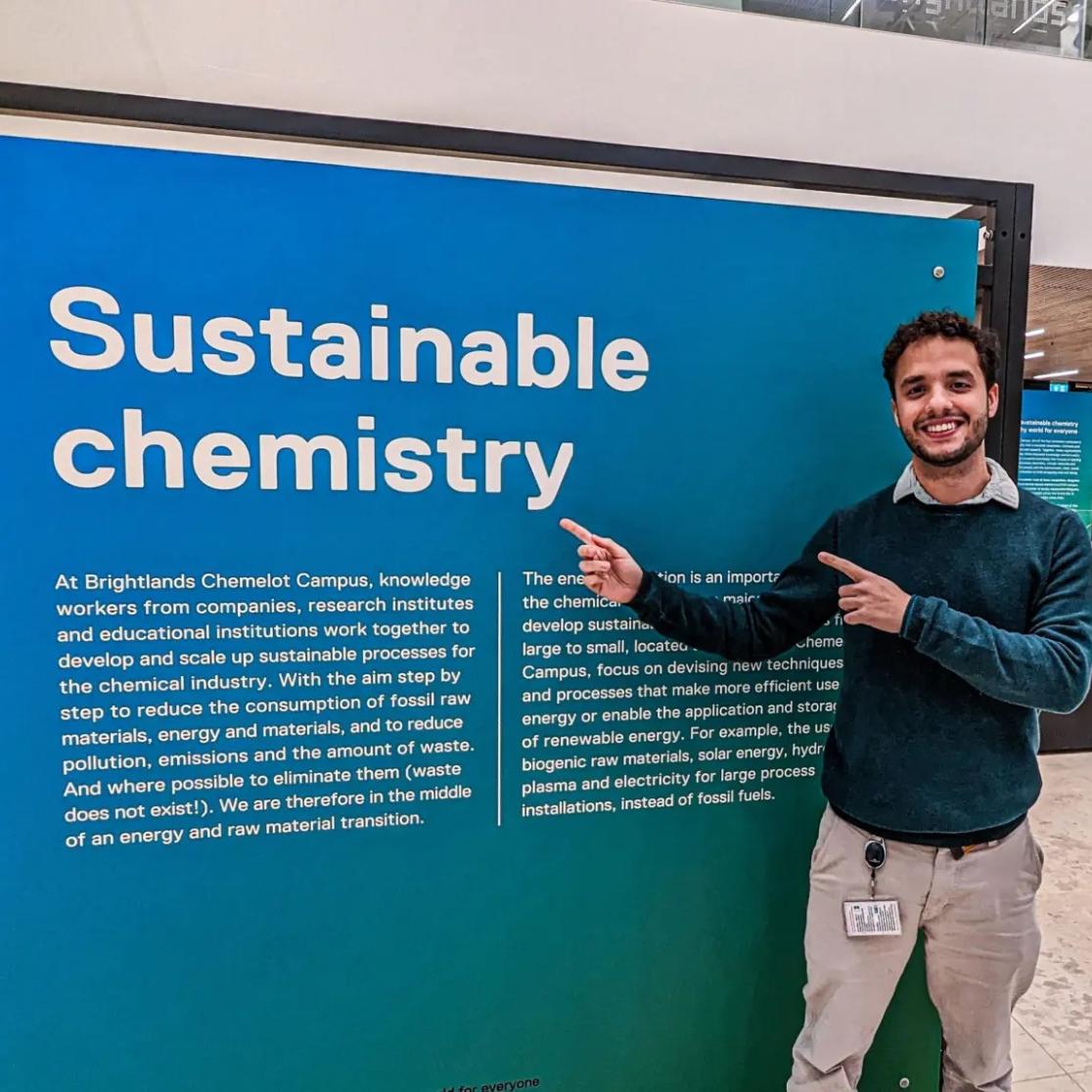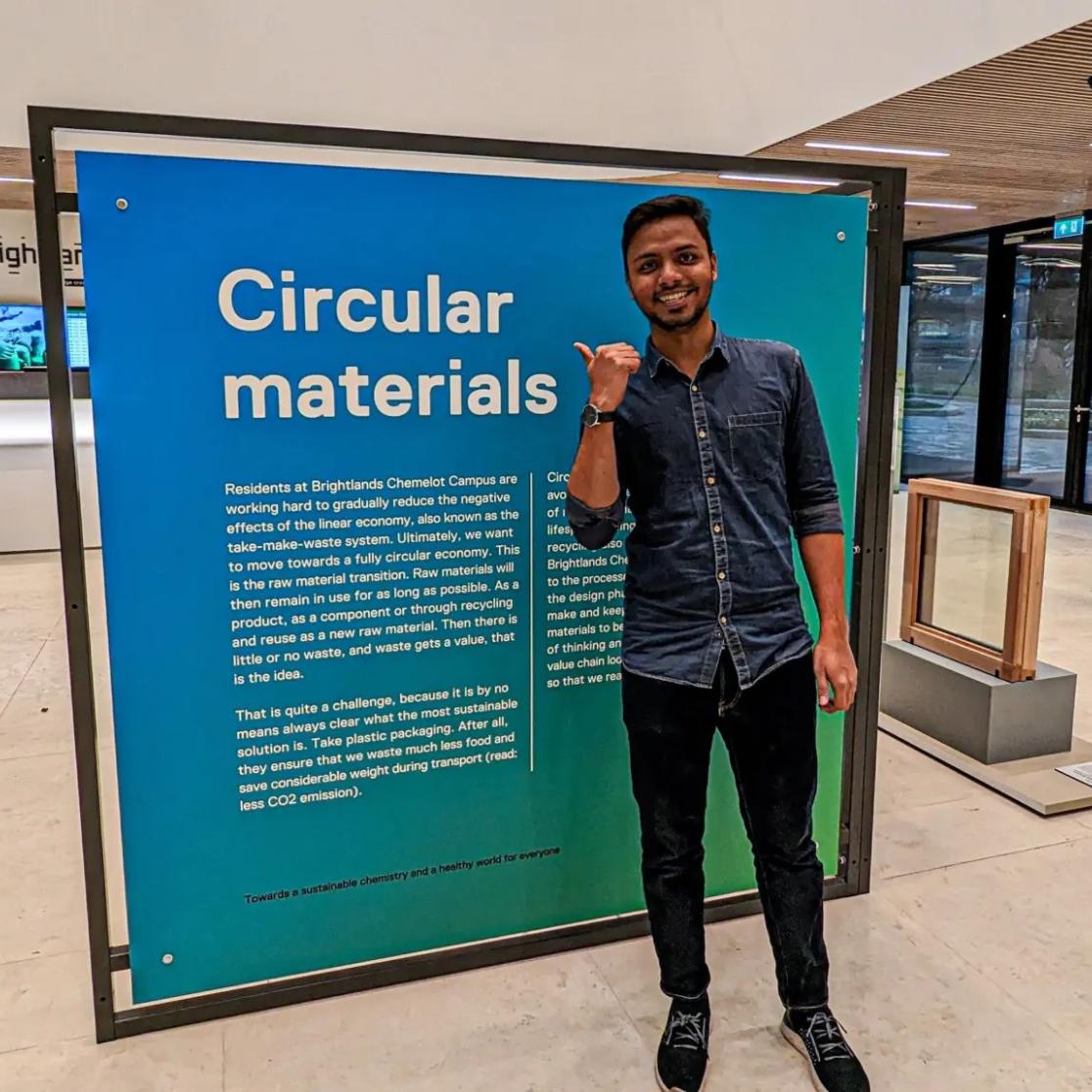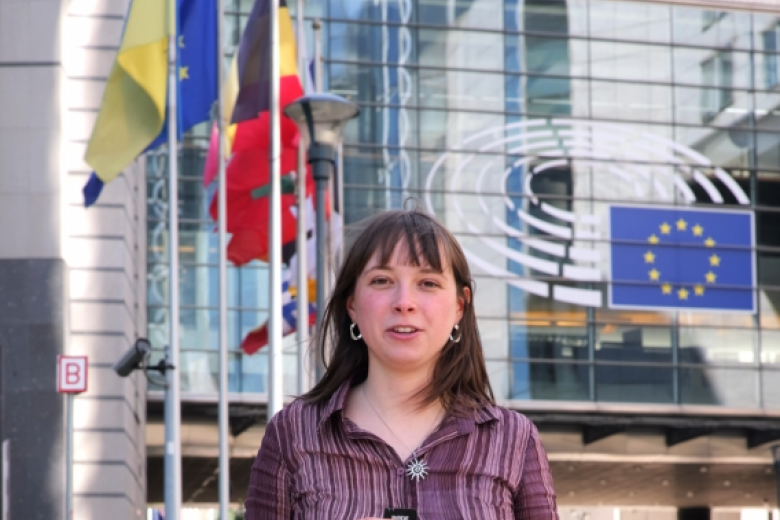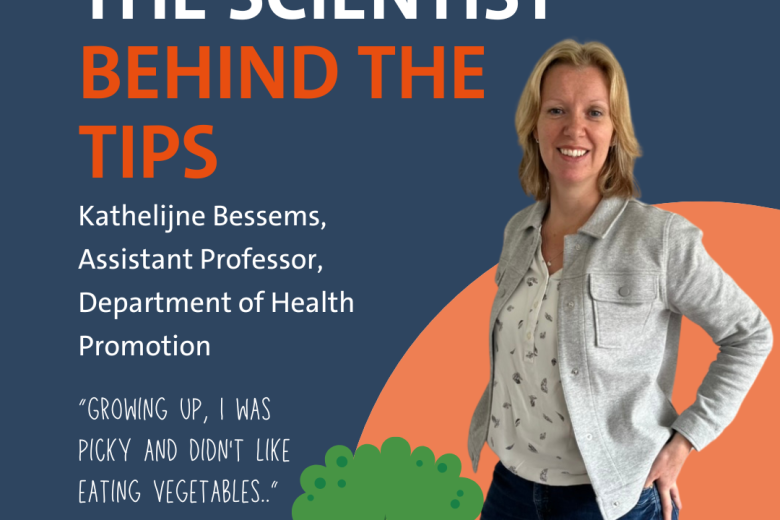Students Gabriel and Mohammad on the UM Brightlands Talent Scholarship
Gabriel Domingues Gonçalves and Mohammad Daud are part of the UM Brightlands Talent Scholarship program, a partnership between Brightlands Chemelot Campus and Maastricht University. ‘You get the chance to experience the future here.’
Gabriel Domingues Gonçalves
Gabriel is from Belo Horizonte, a city in Brazil that forms a triangle with São Paulo and Rio de Janeiro. In 2020, he ended up at CHILL, at Brightlands Chemelot Campus, via an exchange program between Brazilian and Dutch universities. But why specifically Brightlands, of all the places in the world he could have chosen? “To be honest, I applied for an internship at Zuyd University of Applied Sciences. Later I learned that I had to go to the Brightlands campus in Sittard-Geleen instead, to CHILL. It was very exciting because of the combination of a research campus that unites university and industry, the future was suddenly immediately visible.”

Mohammad Daud
Mohammad is from Lucknow, northern India, a two-hour drive from the Taj Mahal, he says. “I graduated in 2020, and wanted to do a master’s but ended up on an automotive campus because of COVID. I worked there for a few years until the world reopened to international education. I was looking for a place where I could use my newly acquired industrial experience for research and development; I was working on an operational level, and not in the design and innovation department. When I read about the UM Brightlands Talent Scholarship program and first visited the Chemelot Campus website, I saw that they offered everything I was looking for; it was all about circularity and sustainability, so I opted for this bio-based materials program scholarship.”

Stimulating community
Gabriel Domingues Gonçalves was surprised by all the things that are offered at the campus. “In Brazil, campuses are mainly focused on university education. Especially at the beginning of my bachelor there was some distance between the university and the industry and it was difficult to understand the role of chemical engineers in industry. Later this got better. Here at the campus there is a much closer relationship between universities and companies, which is very nice. You can really see what the future looks like, feel the energy, talk to people. There are also so many lectures, given by people working for the companies at the campus, and these presentations inspire you with ideas. Before I came here, I actually didn’t have the slightest inkling about that future. Brightlands brings all of this very close. It’s a very stimulating environment to be in.”
“There’s always something going on at the Brightlands Chemelot Campus,” Mohammad adds. “I always make sure to check the screens at the reception desk because there is a lot to do, such as most recently the Marc Cornelissen Brightlands Award. The future is truly visible here. You get the feeling that you’re at the vanguard of international innovation, surrounded by companies and startups that are developing the latest technologies.”
Research
Both students are doing research through the Thesis Research Programme. Gabriel is now in his second year, and is already working on the thesis. “Brightlands challenged us to research recycling, the value chain and changing logistics. The question is how to bring these elements together to create a more sustainable future. The most important idea is to develop a thesis that can be applied at this campus. I studied this at several companies and was particularly taken with Envalior’s recycling project. I applied for an internship and got it in early November. The focus of my research will be on the chemical recycling of polyamide. This is really interesting because when people talk about recycling polymers, they usually think about cutting, remelting and reusing, but we know that this isn’t that efficient because it means you lose quality. Chemical recycling is really the only way to retain the value of the material. I talked to my professor about it and the nice thing about Brightlands is that there is a whole network behind it, full of experts you can consult. The only tricky thing is that you have so many options, and have to make a choice. The people at the campus are very communicative and helpful.”
Mohammad Daud has just started his master’s degree program, and doesn’t know exactly what the thrust of his thesis will be yet, but it will, in any case, have to do with materials. “I’m discussing this with my professor. I don’t have a background in chemistry but I would love to get out of my comfort zone. Still, I think my main focus will be on industrial development, building networks, and the efficiency and productivity of the processes.”
Launched in 2022, the UM Brightlands Talent Scholarship program offers four full scholarships per academic year to a selected number of top-performing non-EU/EEA students who have been admitted (conditionally) to a master's program affiliated with one of the Brightlands campuses.
A required component of the UM Brightlands Talent Scholarship is participation in the Thesis Rsearch Program (TRP), which obligates scholarship recipients to write their thesis based on research at one of the companies based at the respective Brightlands campus. This contributes to the campus’ development.
Opportunities
Gabriel Domingues Gonçalves calls the UM Brightlands Talent Scholarship one of the greatest opportunities he has ever had. “Education is good in Brazil, but you have fewer choices. The scholarship gives me the freedom to choose. There aren’t any real plans for making Brazilian industry more sustainable yet. Sustainability costs money, of course. I’m still keeping my options open for the future. If I feel I’m needed in Brazil and if I think I can make a difference, I might go back.”
Mohammad views India as a fast-growing hub for IT and software and technical innovation. “But people also go for economic security, and look at the money involved. You see many young people going to work in software development or data analysis. There is room when it comes to innovation, but very little competition. My connection to India is strong so I do feel the need to return. There is a lot of potential; it is a developed country after all. I can imagine making a contribution in education and in creating connections.”
Tip for the campus
Both students have a bit of advice for Brightlands Chemelot Campus. They feel the campus is so large that it’s hard to understand exactly which companies are operating in which sectors. Mohammad: “I think it would be better if I could examine all the options, see what companies are there and which sectors they work in. There still isn’t enough understanding about this, particularly from the university side, although the professors are very helpful. It’s also hard for them to assess what all these companies and startups do at the campus.
Gabriel nods. “I had to figure a lot out on my own, which was fun, but at the same time I felt like I could be missing out on something that was better or more interesting.” Mohammad: “Perhaps the companies could provide an overview of the possibilities so that the curriculum and the thesis could be better aligned with one another.”
The future? Gabriel hopes to further expand his research or lead a team in business. Mohammad envisions a role for himself as a researcher, bringing university and industry together. “Win-win,” he calls it.
Source: Brightlands newsletter November 2023
Also read
-
Europe Day
To celebrate Europe Day on 9 May, FASoS student Lisa travelled to Brussels to meet with five of our inspiring alumni who are currently shaping European policy and advocacy. In this video, they share why Europe Day matters, how it’s celebrated in Brussels, and what the idea of Europe means to them.

-
The Green Office Catalyses Circularity Projects’ Autonomy
This semester, the Green Office cultivated the untapped potential of the Community Garden and the Clothing Swap Room. We hope that these Circularity Projects will operate under autonomous, functional organisations by this time next year, with continued support from the Green Office and the SUM2030...
-
Evidence-based health tips for students: the science of eating healthy
In the upcoming months, we’ll share tips on Instagram for our students on how to live a healthier life. Not just a random collection, but tips based on actual research happening at our faculty. The brains behind this idea are Lieve Vonken and Gido Metz, PhD candidates at CAPHRI, the Care and Public...
